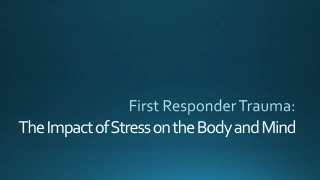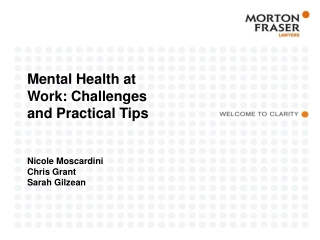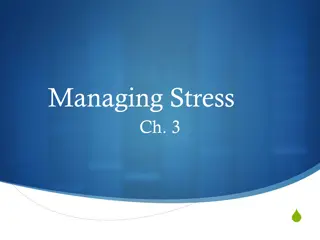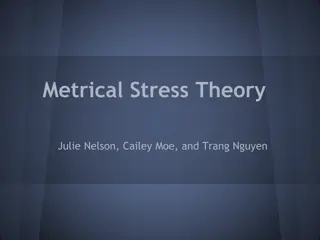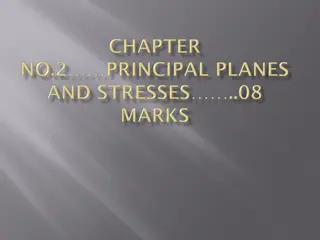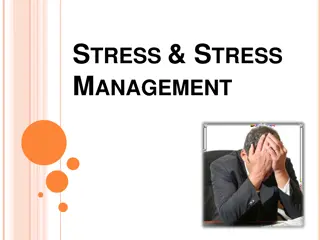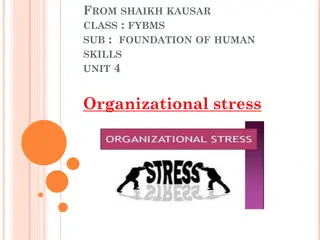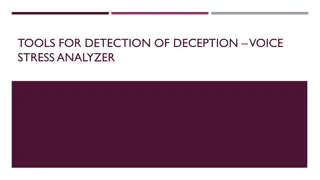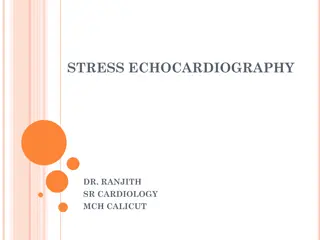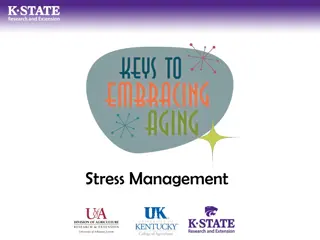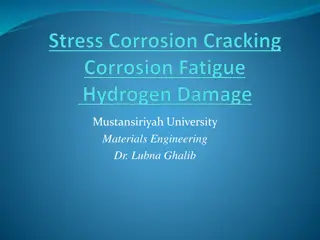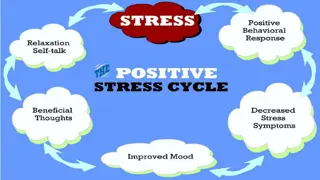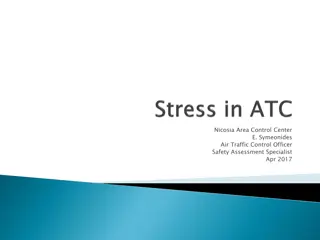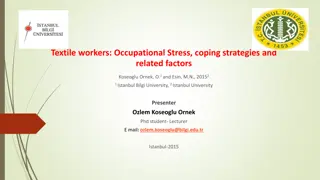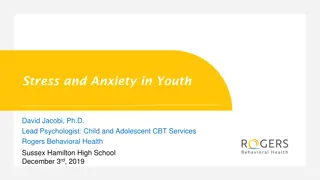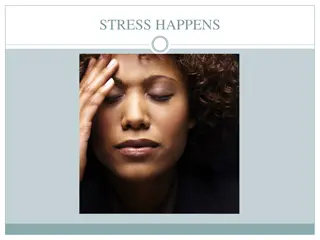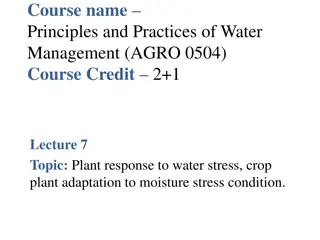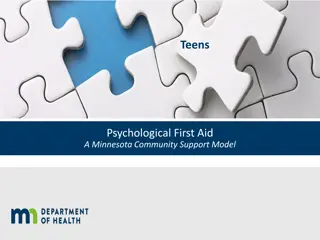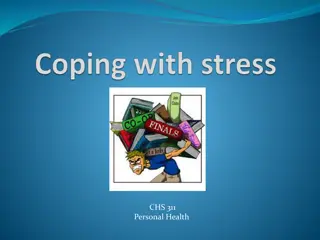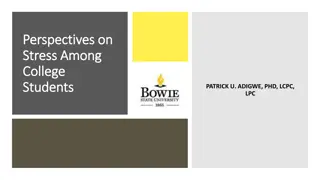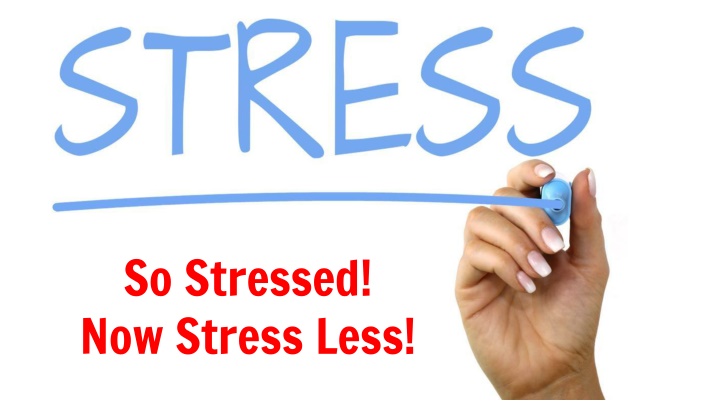
Stress Response - Types, Management, and Impact
Explore the intricacies of stress response, from identifying types of stress to coping strategies and the body's physiological reactions. Learn about Eustress, Distress, and the stages of the stress response system.
Download Presentation

Please find below an Image/Link to download the presentation.
The content on the website is provided AS IS for your information and personal use only. It may not be sold, licensed, or shared on other websites without obtaining consent from the author. If you encounter any issues during the download, it is possible that the publisher has removed the file from their server.
You are allowed to download the files provided on this website for personal or commercial use, subject to the condition that they are used lawfully. All files are the property of their respective owners.
The content on the website is provided AS IS for your information and personal use only. It may not be sold, licensed, or shared on other websites without obtaining consent from the author.
E N D
Presentation Transcript
So Stressed! Now Stress Less!
Instant Activity - Please think about these two questions when you walk into class. 1. What are 5 things that stress you out the most? 2. What are some things you try to do to cope with your stress?
On a scale of 1-10 (1 = low stress & 10 = high stress) Stand and hold up the number on your hand(s) that corresponds to your stress level as a student
Stand and mime one of your go to more healthy coping strategies to deal with stress Try to guess what a couple people are miming near you
Types of Stress Types of Stress Can you think of any good types of stress? This is called a Eustress Can you think of any bad types of stress? This is called a Distress
The stress system is a complex, sophisticated, and carefully regulated adaptation that has been shaped by natural selection because it gives a selective advantage.
The Stress Response - Flight or Fight Autonomic Nervous System: Action within the central nervous system that is reflexive. 1. Sympathetic Nervous System (stimulates our body) 2. Parasympathetic Nervous System (calms our body)
The Stress Response - Flight or Fight 1. Alarm Stage - The sympathetic nervous system takes on an active role in this stage 2. Resistance Stage - Needs to be a healthy balance between sympathetic and parasympathetic. These 2 systems are constantly active, thus constantly trying to maintain balance. 3. Exhaustion Stage - Energy is depleted, body returns to normal if stress is removed. Body returns to alarm stage if stress is not removed
Stress & the Body Stress & the Body - - Flight or Fight Response Flight or Fight Response What do you physically feel when your body is stressed? What physical sensations happen in your body? Increased Heart Rate Increased Breathing Rate Sweaty Palms Butterflies in Stomach Sweating
Stress & the Body Stress & the Body - - Flight or Fight Response Flight or Fight Response What do you emotionally feel when your body is stressed? What feelings might one have when stressed? Anger Frustration Scared Sad Worried Lonely Guilty Anxious
Stress & Behavior Stress & Behavior - - Flight or Fight Response Flight or Fight Response How might one act or behave when stressed? What might you see from someone who is stressed? Arguing Fighting Crying Hurting self Yelling Pushing Violence Acting out
Stress & Coping Stress & Coping - - Relieving the Tension Relieving the Tension What are some healthy coping strategies someone can use to effectively deal with stress? Exercise/Sports Manage time Talk to others Cry Music Deep breathing Writing/journaling Drawing
Stress & Coping at Our School Stress & Coping at Our School Can you think of any stress-coping services at our school? In other words, where could you get help if you felt stressed. List some of them.
Stress Reduction Plan for Teens 3. 1. Tackling the Problem Dealing With Emotions a. b. c. Identify & then address the problem Avoid stress when possible Let some things go a. Take instant vacations (hobbies, read, music) Release emotional tension (talking to someone, creativity, journaling, meditation, crying, laughing) b. 2. Taking Care of My Body 4. Making the World Better a. b. c. d. The power of exercise Active relaxation (Mindfulness) Eat well Sleep well a. b. Contribution makes us feel better Teens who serve feel more gratitude Source: Guiding Adolescents, Ginsburg & Kinsman
Quick Hit Stress Booklet How to Make a Quick and Easy 8 Page Mini-Book From One Piece of Paper Simple silent instructions for a visual lesson on how to make a simple, quick easy mini-book out of one piece of copy paper. Very fun for beginning writers and readers to make their own little book. Or wonderful for those of us young at heart to make a sweet little personalized book as a loving gift. Materials Needed: glue stick scissors 1 piece of 8 1/2" X 11" white copy paper Watch the video to learn how to make the booklet
Resources mindful teen2.jpeg calm image.JPG calm app.JPG
Agree Disagree Teens are more stressed now than when my parents were teens Social media is a source of stress for me I am very good at dealing with or coping with stress in my life School causes me stress The future (life beyond high school) causes me stress My social life causes me stress My current state of stress has a negative impact on my health and well being Our school should do more to help us cope and/or lower our stress levels

